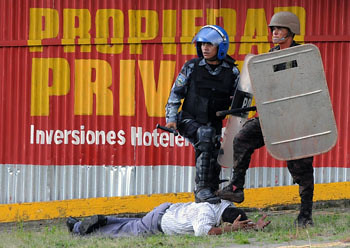Sunday, 8 November 2009
Tegucigalpa-San Jose Accord - Dead?
I have written before about the hollow accord, which Washington heralded as ‘a breakthrough’ and ‘an historic agreement.’ Hillary Clinton spoke of working towards a ‘full return of democracy and a better future for the Honduran people.’ As recently as Friday, Washington continued to refer to the Tegucigalpa-San Jose accord as ‘an historic victory for democracy’. I have also criticised those who were too easily seduced by intoxicating rhetoric (the more perceptive of whom quickly changed their tune). A background to this post can be found here.
One of the more confusing aspects of the Tegucigalpa-San Jose accord was the optimistic response of Zelaya given that it was so riddled with loopholes. A likely explanation for Zelaya’s surprising optimism was that it was part of a longer-term strategy. Should the coup leaders fail to soften their stance during negations, Zelaya would be able to walk away. Only his reinstatement would bring broad international recognition to the forthcoming national elections, meaning that he has considerable leverage. Unfortunately, the coup regime continues to receive recognition and substantial aid from the U.S. As long as Micheletti & co. have this on their side, they still have the power to largely ignore Zelaya and his supporters’ demands, which is exactly what they have done. Zelaya has been left with only his final hand to play; he declared the Tegucigalpa-San Jose accord ‘dead’. Having made a tactical decision to sign the accord, he as been left with little option but to urge his supporters to boycott the elections in the hope that the lack of electoral legitimacy will pressure the next government. Regrettably, the U.S. is pledging to steadfastly recognise the elections regardless of legitimacy, which is undermining Zelaya’s final hand. Whilst Zelaya declares the accord ‘dead’, the U.S. are declaring ‘continued support’ for the accord, regardless of Zelaya.
The reason why the U.S. wishes to talk-up the accord is painfully clear, as Ian Kelly, department spokesperson for the U.S. Department of Sate, said during a farcical press conference, the accord ‘gives us a way to support the elections.’ ‘It is the best way forward’. The accord legitimises the forthcoming elections and offers no reversal on Zelaya’s position as a legal outcast. Zelaya’s tactical decision has backfired because the U.S is continuing to support the dictatorial regime that assumed power by force. Meanwhile Zelaya remains trapped inside the Brazilian embassy, threatened with arrest if he steps foot on Honduras soil.
Whilst Zelaya deserves great sympathy, the accord - even if it returned Zelaya - was always unlikely to give the Honduran people what they deserve. The resistance to the coup is about more than just Zelaya. The people of Honduras want real change, real human rights, and justice for the oppression suffered during the coup regime. An historic victory for democracy? Nothing could be further from the truth.
Subscribe to:
Post Comments (Atom)

No comments:
Post a Comment